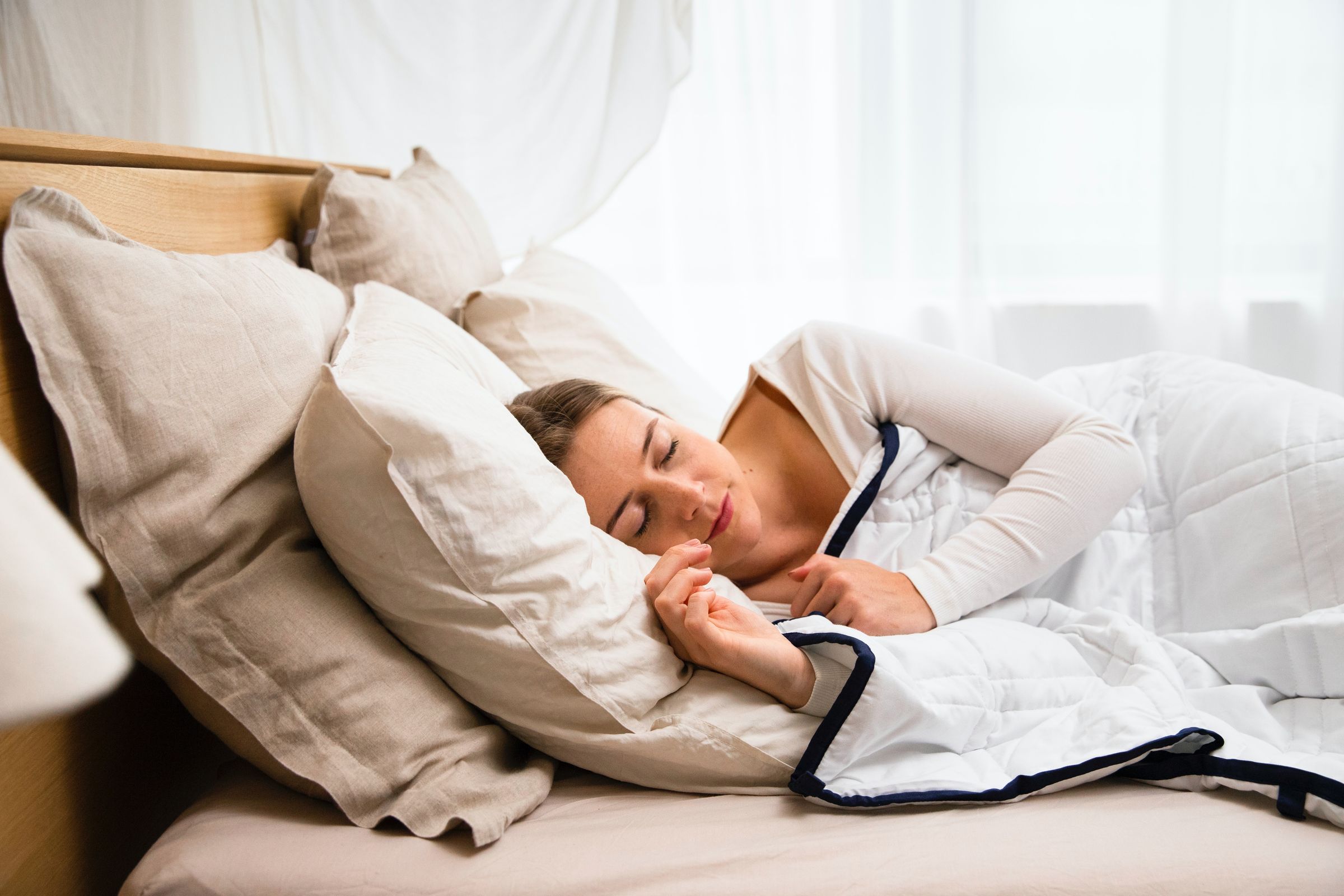Waking Up With Neck Pain? Why & How To Stop It
Written by JaRoy Buffong

Waking up in the morning should be a positive experience.
Unfortunately, many of us wake up everyday with neck pain, which isn’t an ideal start to your day.
In fact, neck pain is one of the top 5 pain disorders, and it’s estimated that 10-20% of the population suffers from this ailment.
Why Your Neck Hurts When You Wake Up
1. Incorrect Sleeping Position
An incorrect sleeping position can directly cause neck pain and stiffness. This is because more strain is placed on the neck due to an awkward or twisted position.
Sleeping on your stomach or side is more likely to cause neck pain.
However, these sleeping positions can be safe for your neck with the help of a memory foam pillow.
These special pillows distribute neck pressure and promote a healthy spinal alignment, leaving you without extra stiffness.
Shop The Groove Pillow Now2. Poor Pillow Choice
While standard pillows work well for some people, they can cause neck pain in others. Regular pillows aren’t as supportive, so they can leave your head and neck with extra strain.
They’re also more likely to promote unhealthy sleeping positions, which increase your chances of a sore neck.
If you want to switch pillows, consider a supportive memory foam option. The benefits of memory foam pillows include more support and a reduction in pain after sleeping. Perfect.
3. Movement During Sleep
Movement during sleep can cause neck pain or stiffness upon waking. Sharp, sudden movements or sitting up too quickly can cause neck issues due to the strain on the neck muscles.
Tossing and turning aren’t normally the cause of prolonged pain.
However, if you toss and turn every night, then this could potentially be the root cause of your neck stiffness actually be causing neck stiffness.
4. Poor Choice of Mattress
Similar to poor-quality pillows, a poor choice of mattress can also cause neck pain. This is because some mattresses don’t offer spine support, leaving your body with extra tension in the neck and shoulders.
5. Pre-Existing Medical Conditions
Pre-existing medical conditions can also lead to chronic neck pain and morning stiffness. Medical conditions linked with neck pain include spinal stenosis, cervical arthritis, and fibromyalgia.
Fibromyalgia is a musculoskeletal disorder that occurs due to overstimulation of the nerves between the spinal cord and the brain.
A 2016 study (Markkula, Kalso and Kaprio, 2016) found that 65% of sufferers experienced neck pain, stiffness, and other common symptoms.
Spinal stenosis is a degenerative spine disease characterised by neck and leg pain.
This is usually caused by the narrowing of the spinal column, which affects the canals spinal nerves travel through. Spinal stenosis most frequently affects the upper neck and lower back (Raja et al., 2021).
Cervical arthritis (also known as spondylosis) refers to the wearing down of the cervical vertebrae. Neck pain and spinal growths are common symptoms of this condition.
Studies have found that analgesics and anti-inflammatory medicines can reduce severe pain from cervical arthritis (Binder, 2007).
All of these must be treated by a professional, and standard treatment plans include pain medication and physical therapy.

How To Prevent Neck Pain In The Morning
Thankfully, there are some ways to relieve neck stiffness and pain. See the top five prevention strategies below.
1. Choose the Right Pillow
The best pillows for preventing neck pain are made from memory foam and have a cervical shape.
These specialised pillows ensure your neck is supported and has a healthy spinal alignment.
Memory foam pillows also improve your sleep posture, reduce overall tension, and improve your breathing.
With a high-quality pillow on your side, you can experience better sleep and less pain. Get a head start and learn how to choose the best pillow for neck pain now.
Browse Memory Foam Pillows2. Maintain a Healthy Sleeping Position
A healthy sleeping position can also reduce neck pain and soreness in the morning.
Instead of sleeping with your head twisted or under pressure, keep your spine aligned and your head and neck supported.
Sleeping on your back or side is the best for preventing neck pain, but you should ensure your neck is straightened or supported by a memory foam pillow to reduce stiffness.
Learn how to use a memory foam pillow before you start sleeping on it for the best results.
3. Regular Exercise and Stretching
Another way to reduce and prevent neck pain is by stretching and gently exercising your neck.
Tilting your head to the side or repeating forwards and backwards motions can help you keep your neck muscles limber without adding extra pressure.
Neck exercises must be done frequently to prevent a stiff neck or sore muscles, and the NHS recommends up to 2 to 3 times per day (www.nhsinform.scot, n.d.).
Make sure you use a guide or learn how to stretch your neck properly before getting started.
4. Pain Killers
Standard painkillers (such as Ibuprofen and Paracetamol) can also help prevent neck pain.
These can be taken to reduce pain in the mornings.
However, if you rely on the medication or the pain isn't going away after taking them, it's time to see a physician.
5. Alternative Treatments
Other alternative treatments for neck pain include acupuncture, massage, ice compresses, soft neck collars, and heating pads.
However, keep in mind that alternative treatments don’t work well for everyone.
For example, a 2020 meta-analysis on acupuncture for neck pain found moderate evidence that it relieves pain (Farag et al., 2020).
Alternative treatments can help to relieve pain, especially if you need quick pain relief at home.
But if symptoms persist, it might be time to visit your healthcare provider.
When to Seek Medical Help

A sore neck after sleeping can be monitored and treated at home. But if the pain persists or worsens, you might need medical help.
If you experience any of the following symptoms then you should visit the doctor's office:
Pain despite taking OTC pain medications
Worse pain when lying down
Lumps or swollen glands in the neck
Pain due to an injury
Symptoms that last longer than one week
If you notice any of these signs, it's time to book an appointment with your healthcare provider.
However, if your neck pain is combined with headaches and fevers, consult emergency medical advice, as they could be signs of a serious health condition (e.g. meningitis).
Final Words
Experiencing a sore neck after sleeping is unpleasant, to say the least.
For most neck pain sufferers, the cure is as simple as buying a new supportive neck pillow. But it's always better to be safe and sure.
Shop Groove Pillow NowAbout The Author
JaRoy Buffong is the founder and lead coach of Naiquan, a dynamic wellness company that empowers individuals to realize their full potential through a comprehensive 360° approach to well-being.
With a deep understanding of the interconnectedness of physical, mental, and emotional health, JaRoy is committed to helping clients achieve sustainable, long-term transformations.
References
- Binder, A.I. (2007). Cervical spondylosis and neck pain. BMJ, 334(7592), pp.527–531. doi:https://doi.org/10.1136/bmj.39127.608299.80.
- Farag, A.M., Malacarne, A., Pagni, S.E. and Maloney, G.E. (2020). The Effectiveness of Acupuncture in the Management of Persistent Regional Myofascial Head and Neck Pain: A Systematic Review and Meta-Analysis. Complementary Therapies in Medicine, [online] p.102297. doi:https://doi.org/10.1016/j.ctim.2019.102297.
- Khired, Z. (2022). The Prevalence of and Factors Associated With Neck Pain Among Jazan Adult Population. Cureus. doi:https://doi.org/10.7759/cureus.28008.
- Markkula, R.A., Kalso, E.A. and Kaprio, J.A. (2016). Predictors of fibromyalgia: a population-based twin cohort study. BMC Musculoskeletal Disorders, 17(1). doi:https://doi.org/10.1186/s12891-016-0873-6.
- Raja, A., Hoang, S., Viswanath, O., Herman, J.A. and Mesfin, F.B. (2021). Spinal stenosis. [online] PubMed. Available at: https://www.ncbi.nlm.nih.gov/books/NBK441989/.
- www.nhsinform.scot. (n.d.). Exercises for neck muscle and joint problems. [online] Available at: https://www.nhsinform.scot/illnesses-and-conditions/muscle-bone-and-joints/exercises/exercises-for-neck-problems#:~:text=Aim%20to%20do%20this%202 [Accessed 15 Aug. 2023].

